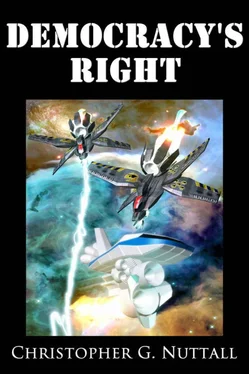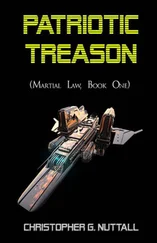He pushed that thought aside as he contemplated the tactical situation, tossing options around in his head. His crew could handle the incoming missiles from Greenland. Luckily, the orbital fortress seemed to be holding its fire while the enemy fleet waited for Colin’s surrender, although that wouldn’t last. Colin had heard rumours about Household Troops firing on targets just to ensure that the Imperial Navy didn’t have a chance to capture them. All of a sudden, those reports seemed alarmingly creditable.
The enemy commander, unless he had another trick up his sleeve, hadn’t timed it just right, although given the problems with coordinating operations across light years, he’d done better than anyone could reasonably have expected. If Colin chose to continue towards the planet, even accelerating, he would be forced into a close-range action against the orbital fortresses, one where his ships wouldn’t have the advantage. If he broke away from the planet, they would certainly be committed to a missile duel with the enemy superdreadnaughts… which, if they managed to run them down because of their higher velocity, would have a chance to bring them into energy range. And if that happened, the rebellion was finished, along with the superdreadnaughts. The enemy commander, intentionally or otherwise, had caught Colin between two fires.
Just for a second, Colin felt indecision creeping up on him, but remaining where they were would be the worst choice of all. “Signal the enemy ships,” he ordered. “Tell them” — his lips twitched in delight — “ hell no!”
“Aye, sir,” the communications officer said. Whatever the Empire might say about fair treatment, or even forgiveness, they all knew better. The Empire would either execute them on the spot or dump them all on a penal world, with no hope of escape. “They’re not responding.”
The display sparkled with bright red icons. “I think they have responded,” Colin said. Absurdly, a stray thought ran through his mind, reminding him of the lessons on human-alien interaction back at the Academy. Most of them had been about how important it was to teach the aliens that humanity was the superior race and any resistance would bring death, but some had been genuinely interesting. Aliens often had different ways of communicating than humanity, yet some ways of communication had been universal. Opening fire, for one, was a pretty good way of conveying threatening intent. “Helm” — he tapped his console for a moment, designating a new course — “alter course as specified.”
“Aye, sir,” the helmsman said. If he had doubts about the wisdom of the course, he didn’t show them. Colin wouldn’t have been surprised if he had. In order to avoid fire from the superdreadnaughts, he was flying alarmingly close to the orbital stations. The wave of incoming missiles the fortress had launched might have been battered down, evaded, or survived, but there were would be more coming at them soon. “We are altering course… now.”
Colin nodded. Whoever was in command of the enemy ships would know, now, that he intended to fight. The only question remaining, therefore, was brutally simple. Could his ships survive long enough for them to power up their drives and escape?
* * *
“They rejected the officer,” Captain Faulding said, in tones that suggested that it was a personal insult. “They refused even to discuss it with us!”
“They would have been stalling,” Brent-Cochrane pointed out. He had half-expected the rebels to try just that, but he would have demanded that they powered down all of their systems before entering any discussions. They would doubtless have refused. “You may fire at will.”
His superdreadnaught shuddered as another salvo was unleashed towards the enemy ships, which were rapidly reconfiguring themselves into a new formation. In theory, they possessed equal firepower to Brent-Cochrane’s ships, which at least raised the possibility of the enemy commander electing to fight a duel with energy weapons. In practice, it wasn’t too likely that Commander Walker would dare. Both sides would suffer horrendous damage, but Brent-Cochrane was in a friendly system and Commander Walker was… not.
He watched as the rebel point defence started to engage his missiles and scowled. Their point defence was more effective than he had expected… and he suspected that their damage control was even better. The ships were over-engineered — the Imperial Navy Design Board was composed of professional paranoids — yet that didn’t explain the improved performance that the rebels were getting from some of their systems. For the first time, Brent-Cochrane had doubts about his chosen course of action. Would it not be wiser to put the plot to dislodge Percival to one side and unite against the rebels?
“Send a signal to Greenland,” he ordered, softly. “Tell them that I want their Household Troops out here supporting us.”
“Aye, sir,” the communications officer said. There was a long pause as the rebels continued to move away from the planet, and then opened fire in unison. Brent-Cochrane let out a breath he hadn’t known that he had been holding. There were no unexpected additions to their firepower. “Commodore, they’re refusing, citing safety concerns…”
“Fuck them,” Brent-Cochrane scowled. He smiled darkly. If the Household Troops refused to come and join the fight, they were damn well not getting any of the credit. “Continue firing.”
Colin watched, as dispassionately as he could, as the first salvo of missiles from the superdreadnaughts roared into the teeth of his point defence. Missile after missile vanished as the datanet designated them as targets and picked them off, but there were always other missiles to take their place. The enemy commander had been canny enough to load his external racks before arriving at Greenland and it had given him the throw weight to take a massive toll on Colin’s systems. A handful of missiles slipped through the defence network and slammed against the shields, shaking the massive superdreadnaught as they struggled to remain on an even keel.
“No damage, but shields were nearly overloaded,” the tactical officer warned. Colin nodded, sourly. The tactical instructors at the Academy had warned them, time and time again, that the opening barrage was the most important and he’d wasted his opening barrage on the orbital fortress. It was damaged — the superdreadnaughts had hit it quite badly — but it couldn’t actually give chase. Moving with ponderous inevitability, the enemy superdreadnaughts were converging on his fleet, tightening the range. The only advantage the rebels had was that their missiles didn’t have to fly so far to hit their targets. Colin wasn’t unaware of the irony. He was in the same position as the enemy ships at Jackson’s Folly. “The damage control parties are moving up replacement shield generators now.”
The superdreadnaught rocked alarmingly as another missile slipped through the defences and struck the shields. It shouldn’t have been so dangerous, but with so many impacts in so short a space of time there was a good chance that one or more of them would overload and burn out a shield generator, rendering the hull vulnerable. Superdreadnaughts were the most heavily armoured ships in space, easily able to take one or more hits, but even they had their limits. When missiles started exploding inside the hull, the ship was very close to being destroyed or crippled. It wouldn’t make much difference, Colin knew; they were nowhere near friendly territory.
He looked up at the timer, counting down the seconds. He’d never intended to stay longer than an hour in the system, but he’d started recycling the flicker drives at once, just in case the defenders proved unusually robust. The enemy ships had ten minutes to cripple or destroy them before Colin could run; ten minutes… it might just be long enough. Their closing speed was slowing as Colin’s own ships fought to increase speed, but it wouldn’t be enough to save them from an energy duel. Two converging lines formed on the display as he ran through the tactical problem. The enemy ships would be within energy range for at least a minute before he could run, which meant… the rebellion was on the verge of failing.
Читать дальше












